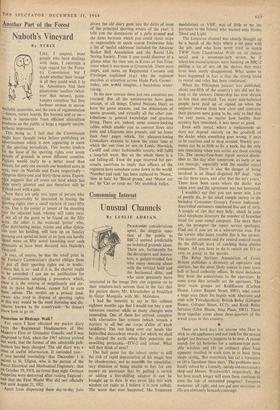Consuming Interest
Unusual Channels
By LESLIE ADRIAN I had the temerity to say in this column eighteen months ago that I would not buy a new television receiver while so many changes were impending. One of them has arrived, complete with alternative line systems (which remain a mystery to all but our corps d'elite of knob twiddlers). The rest hang over our heads like bejewelled damoclean swords, for which we shall be charged the earth when they penetrate our unwilling pericrania—ITV-2 and colour. What will they think of next?
The bull point for the teleset renter is still the risk of rapid depreciation of his magic box by obsolescence, not to mentitIn the unsatisfac- tory situation of being unable to buy for any money an assurance that by pulling a switch or adding a five-shilling adaptor it can be brought up to date. It was never like this with wireless (or radio as I believe it is now called). The worst that ever happened, like frequency modulation or VHF, was of little or no im- portance to the listener who wanted only Home, Third and Light.
The kangaroo channel was clearly thought up by a bunch of the boys where a set goes with the job, and who have never tried to watch TWW from Llandrindod Wells on an indoor aerial and a seventeen-inch screen. So if television manufacturers were banking on BBC-2 pulling a lot of sets off the shelves they must have been sorely disappointed. What seems to have happened in fact is that the strong trend to rental and relay has been reinforced.
When the Pilkington palaver was published, about one-fifth of the country's sets did not be- long to the viewers. Ownership has now shrunk to less than one-third. Too many non-technical people have paid up or signed on when the engineer showed them how clear and contrasty their pictures were going to be, only to find that for ever more, no matter how healthy their mystery box remained, it was never as good.
Even with rental, where a replacement set does not depend entirely on the goodwill of the dealer when something goes wrong, it pays to be cautious and to shop around. Weekly pay- ments can be as little as 8s. a week, but the only sets remaining when you arrive are those costing 12s. The twenty-four-hour repair service dimin- ishes to 'the day after tomorrow, as early as we can manage,' especially with the smaller rental companies. There is also the danger of being involved in an illegal disguised HP deal: 'sign on for three years, and after that the set's yours.'
There have been cases where the dealer was taken over and the agreement was not honoured. I wouldn't say that you can never win. Lots of people do, as the small sample survey in the
Swindon Consumer. Group's Forum indicated:
dissatisfied customers numbered five out of sixty. A couple of tips that may help: check in your local telephone directory the number of branches listed for your rental company. The more there are, the prompter the repair service (perhaps).
Find out if you are in a wire-service area. For the viewer who hates trouble, this is the answer. The master antenna and the central control room do the difficult work of catching those elusive images. All you have to do is switch on. It's as easy as going to the movies.
The Relay Services Association of Great Britain publishes a directory of operators and districts, but the most likely source is your town hall or local authority offices. In most instances they lease the concessions to the operators. In some areas they actually are the operators. The three main groups are Rediffusion (Carlton House, Lower Regent Street, SW1), who cover a huge area (their list begins with Abercarn and ends with Ystradgynlais); British Relay (Giltspur House, Giltspur Street, EC1); and Rank Relay Services (Glen House, Stag Place, SW1). These three together cover about three-quarters of the wired areas in this country.
These are hard days for anyone who likes to stick to old appliances and not krush for the newest gadget just because it happens to be new. A recent search for (a) batteries for a suitcase-type port- able wireless and (b) an ordinary glass" fruit squeezer resulted in each case in at least three shops saying, 'But everybody has (a) a transistor or (b) a liquidiser these days.' The problems were finally solved by a friendly, untidy old electrician's shop and Messrs. Woolworth's respectively. But for how much longer will even these continue to stem the tide of unwanted progress? Tempora mutantur, all right, and nos qui non mutamur in illis are obviously beneath contempt.




























 Previous page
Previous page